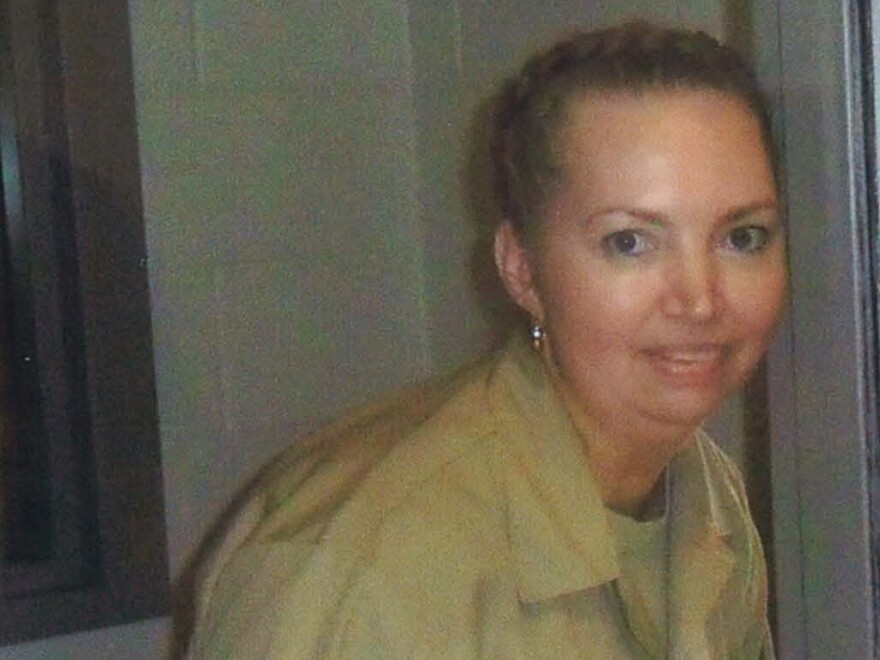Updated at 2:14 a.m. ET Wednesday
Editor's note: This story includes information that may be upsetting to some readers.
Lisa Montgomery, the only woman on federal death row, died by lethal injection early Wednesday after the Supreme Court vacated several lower-court rulings, clearing the way for her to become the first female prisoner to be put to death by the U.S. government since 1953.
It was midnight when the Supreme Court ended a day of legal challenges, setting aside what Department of Justice attorneys called "unwarranted" obstacles to the execution of Montgomery for a "crime of staggering brutality." By 1:31 a.m. ET Wednesday, she was pronounced dead.
Just ahead of Montgomery's execution at the Federal Corrections Complex in Terre Haute, Ind., her attorney, Kelley Henry, said her client's death by lethal injection was far from justice, as no other woman who had committed a similar crime faced the death penalty.
In 2004, Montgomery drove from Kansas to Missouri, ostensibly to purchase a puppy from Bobbie Jo Stinnett, a 23-year-old dog breeder who was eight months pregnant. Instead, Montgomery strangled her, cut her fetus from her womb and tried to pass the surviving baby off as her own.
Four years later, she was sentenced to death.
Until Montgomery's death overnight Wednesday, it had been nearly 70 years since a woman on federal death row had been executed.
The execution followed an intense, 11th-hour, court battle over Montgomery's fate.
U.S. District Judge Patrick Hanlon in Indiana granted a stay of execution, citing the need to determine whether she was too mentally ill to be executed.
On Tuesday, an appellate court in Chicago reversed that decision, paving the way for the execution to go forward. But in a separate ruling, an appeals court in Washington, D.C., blocked the execution to give time for hearings on whether the Department of Justice had given sufficient notice of Montgomery's execution date, which was set for Tuesday. The Department of Justice challenged that ruling.
A whiplash of legal challenges and decisions continued throughout the day until the Supreme Court's midnight ruling allowed the federal Bureau of Prisons to proceed with the plan to end Montgomery's life by lethal injection. Montgomery's lawyers had also filed a clemency petition asking President Trump to commute her sentence to life in prison, to no avail.
In preparation, authorities had transferred Montgomery on Monday from the federal women's prison in Texas where she had been held for more than a decade to the Indiana facility. The family of the woman she murdered, had traveled there as well to witness Montgomery's death.
Henry, Montgomery's attorney, said throughout the legal proceedings that no one was excusing Montgomery's actions, but that her troubled life provided context for the crime. She said her client had brain damage and severe mental illness that was exacerbated by a lifetime of abuse, including child sex trafficking, gang rape and physical abuse largely at the hands of family members.
She said the Constitution, "forbids the execution of a person who is unable to rationally understand her execution," Henry said in a statement shortly after the Supreme Court issued its final order.
"The government stopped at nothing in its zeal to kill this damaged and delusional woman," the attorney said.
Montgomery's execution is one of three that the Justice Department had scheduled during this final full week of the Trump administration. The two others were halted by a federal judge on Tuesday.
Cory Johnson, 52, was scheduled for execution on Thursday for his involvement in the murder of seven people nearly three decades ago. Dustin John Higgs, 55, was scheduled to be put to death on Friday for his involvement in the murder of three women nearly 20 years ago. Both have tested positive for COVID-19 and the judge ordered their executions be delayed until mid-March to allow them to recover. The Justice Department has appealed that order.
If the judge's delay is overturned, those executions could be the last to occur for the foreseeable future. Senate Democrats unveiled legislation Monday that would abolish the federal death penalty, and President-elect Joe Biden has said he wants to eliminate it as well.
In 2019, the Justice Department announced it would revive federal executions after a 16-year hiatus. Under the Trump administration, 10 men have been executed since July 2020.
Now one woman joins the list of those put to death.
Copyright 2021 NPR. To see more, visit https://www.npr.org.








